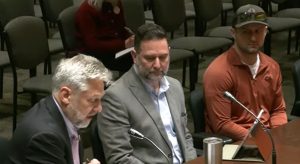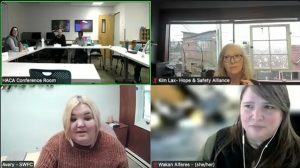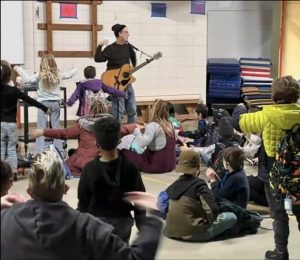‘We The People’ call for the federal job guarantee
7 min read
Presenter: Alan Cohen from a new Oregon political party called ‘We The People’ has been sharing policy ideas that have all but disappeared from national consideration. He previously spoke about voter recall of Supreme Court decisions. Today, he suggests revisiting the federal job guarantee.
Alan Cohen (We The People): Today, I would like to reintroduce the federal job guarantee. Though it may not have been the first time it was considered, the job guarantee entered what we often call ‘the national conversation’ in Franklin Delano Roosevelt’s State of the Union address on Jan. 6, 1941, when FDR introduced his Four Freedoms: freedom of speech, freedom of worship, freedom from want, and freedom from fear.
[00:00:46] In that speech, he observed that ‘there is nothing mysterious about the foundations of a healthy and strong democracy. The basic things expected by our people of their political and economic systems are simple. They are: equality of opportunity for youth and for others; jobs for those who can work; security for those who need it; the end of special privilege for the few; the preservation of civil liberties for all.’
[00:01:19] Presenter: FDR introduced the idea in 1941. Who else has advocated for it?
[00:01:24] Alan Cohen (We The People): This issue was revisited by Martin Luther King, Bayard Rustin, and others in the 1960s, and after his death by Coretta Scott King, who had a role in drafting the 1978 Full Employment and Balanced Growth Act, which established an interim five-year target of 3% unemployment for individuals 20 years of age and older, and 4% for individuals 16 and over, within five years, with full employment to be achieved as soon as practicable thereafter.
[00:02:02] However, that act has largely been ignored in practice, as the final version weakened the full employment mandate from a commitment to a goal. The U.S. government has never achieved the reasonable employment targets set in the law.
[00:02:20] In other words, the concept did finally get embodied in a law still on the books. But that law is ignored because the business community managed to change the term ‘commitment’ to ‘goal’ and has since gotten Congress to accept its failure to comply with the law.
[00:02:39] A variety of forces militate against the law’s enforcement. The first is that the Federal Reserve’s unspoken but hinted-at goal is to keep unemployment at approximately 4%. If unemployment gets too low, that means the economy is too hot, and it will increase the prime lending rate.
[00:03:00] Another is that businesses have an interest in the cheapest possible labor force.
[00:03:07] A third is that corporate America is opposed to government employment and has promoted privatizing everything from education in prisons to the military and medicine.
[00:03:20] As a result, the number of civil service employees has decreased since 1970, although the number of citizens was up 77% and private sector employment up 140% just recently, even before President Trump took office in 2025 and created DOGE to cut civil service further.
[00:03:47] Presenter: How will a federal job guarantee affect employment?
[00:03:50] Alan Cohen (We The People): A lot depends on how we define employment. At present, anyone who does any work as a paid employee, (even for an hour a week), or who works 15 hours or more in an unpaid family enterprise (even if it is in the red).
[00:04:05] So gig workers, part-time workers, workers in enterprises that have negative income are all considered employed, while able-bodied skilled individuals who have given up looking for work because they could not land a job are not counted as unemployed.
[00:04:22] If we include all the people who want a full-time job with a living wage and benefits but do not have one, unemployment is closer to 25% than 4%.
[00:04:32] Another way to look at this: The labor force participation rate (the percentage of people 16 and older engaged in the labor market, including those unemployed but looking for work), is only 62%. Including people over 65 does skew this data; for those 25 to 54, the rate is 84%. But it is notable that even in the prime of life, 16% are not working or looking for work. But again, this includes all part-time work.
[00:05:05] Yet another perspective is provided by Matthew Desmond in Poverty, by America. Of the roughly 750,000 workers around the globe who make and sell Apple products, only around 63,000 work directly for Apple. Before the rise of this chopped- up or ‘fissured’ workplace, large firms standardized wages and benefits for all their employees. This had an equalizing effect, raising the income of say a janitor at an automobile factory.
[00:05:39] Today, temp agencies compete over who can offer the cheapest labor. OnContracting, a staffing agency, estimates that U.S. tech companies like Google and Apple can save an average of $100,000 each year per job by using their services.
[00:05:59] As corporations have increasingly come to rely on independent contractors, they have depressed wages and hindered workers’ abilities to earn promotions. After all, if you’re not working for Apple, how can you earn a promotion with Apple?
[00:06:15] A federal job guarantee would revolutionize such statistics. If anyone who wanted a job could get one, unemployment could drop to zero, and the labor force participation rate could climb into the 95% range in the prime of life. The growth in productivity would be staggering and inequality would begin to recede.
[00:06:36] Presenter: How would such a federal job guarantee work?
[00:06:39] Alan Cohen (We The People): At present, the owners and managers of businesses make the primary decisions about what kind of work gets done. If something doesn’t bring in large profits, a business has no interest. As a result, there are many needs not being served. With a job guarantee, the government would once again decide what work gets done based on what people want and need.
[00:07:02] During the Depression, when the Civilian Conservation Corps, the Civil Works Administration and the Work Projects Administration were created to provide work for Americans not served by the private sector.
The CCC alone employed about 5% of the U.S. male population at the time. It built and repaired roads, trails, bridges, dams and buildings, dug reservoirs, irrigated fields and created drainage for flood control, planted trees, thinned saplings, cut fire breaks, fought fires, stocked fish, and maintained critical infrastructure. It built and improved state and national parks.
[00:07:47] Today we have enormous needs just in fighting fires, particularly here in Oregon. We could build libraries and civic buildings, earthquake-proof and insulate existing buildings, fill potholes, inspect and correct efficiencies in bridges, dams, roads and reservoirs, build out a resilient electrical grid, wind farms, solar farms, etc. There are a myriad of jobs that really need to be done.
[00:08:16] Of course, not everyone does outdoor work or construction. People have different skills and different lifestyles. Some may want to travel and go wherever there is a need, but most will likely want to have jobs close to home.
Federal, state, and local officials could work together to decide what a community needs. Teachers, doctors, secretaries, pharmacies, whatever the market will not, cannot, or does not provide, where there are drug shortages, when Internet access is poor, where there is no public transportation, support in their homes for the elderly, etc., such shortages could be served.
[00:08:56] So when Amazon lays off 10,000 workers, those workers would go to their local job opportunity offices to register for short-term unemployment pay while reviewing the jobs on offer and suggesting what they might productively do. Matching the unemployed with jobs would become easier with time. It would make a great deal of unemployment expenditure unnecessary and provide presently unavailable or inadequate products and services.
[00:09:25] Presenter: What effect might a federal job guarantee have on wages?
[00:09:28] Alan Cohen (We The People): At present, the civil service minimum wage is $10.71 an hour ($484.40 a week, $22,276 a year). Of course, national minimum wage for hourly workers is $7.25 an hour (or $290 per week, $15,080 per year). I have no idea how anybody lives on that. And for tipped employees, $2.13 per hour.
[00:10:01] It is less known that the minimum wage for salaried employees is $8.44 a week, $21.10 an hour, or $43,888 annually.
[00:10:14] State and local governments legislate their own minimum wages. Washington, D.C.’s is $17 an hour. Seattle’s is $19.97 an hour. In general, the civil service pays less than the private sector for an equivalent job, but it often has better benefits.
[00:10:35] There are therefore two primary options when introducing a federal job guarantee. The less controversial would be to use the civil service categories as they presently exist and provide such salaries to the new workers seeking jobs.
[00:10:51] However, if there were a government of, by, and for the people in place (without which a federal job guarantee will never see the light of day, the 1978 Full Employment and Balanced Growth Act notwithstanding), the government could adopt a $20 an hour wage (the equivalent to $15 plus inflation since 2016 when the Fight for $15 arose), or to provide a true living wage with a cost-of-living increase attached.
[00:11:23] At the top, the highest civil service salary today is less than $163,000. Executives are paid more. Dr. Anthony Fauci was America’s highest-paid bureaucrat with a final salary of $480,654. For a comparison, in 2024, CEO pay in S&P 500 companies increased 7% from the previous year to an average of $18.9 million in total compensation.
[00:11:53] Meanwhile, the median U.S. worker made just $49,500. Higher minimum civil service salaries would, of course, change the minimum wage because the private sector would have to compete with the government for employees. There would probably be less layoffs. Many companies would go out of business because at present they do not pay fairly for the labor they use and do not actually are not actually productive.
[00:12:22] Homelessness would diminish, health would improve, and there would be less need (and so less expenditure) for the various components of the safety net. The job requirement for participation in safety net programs would become much easier to manage if it was still felt to be necessary and the relevance of a minimum basic income would disappear.
[00:12:44] Presenter: Alan Cohen invites you to check out ‘We The People,’ a new political party with ballot access in Oregon. Information about the Lane County chapter appears at WTPLane.org.






